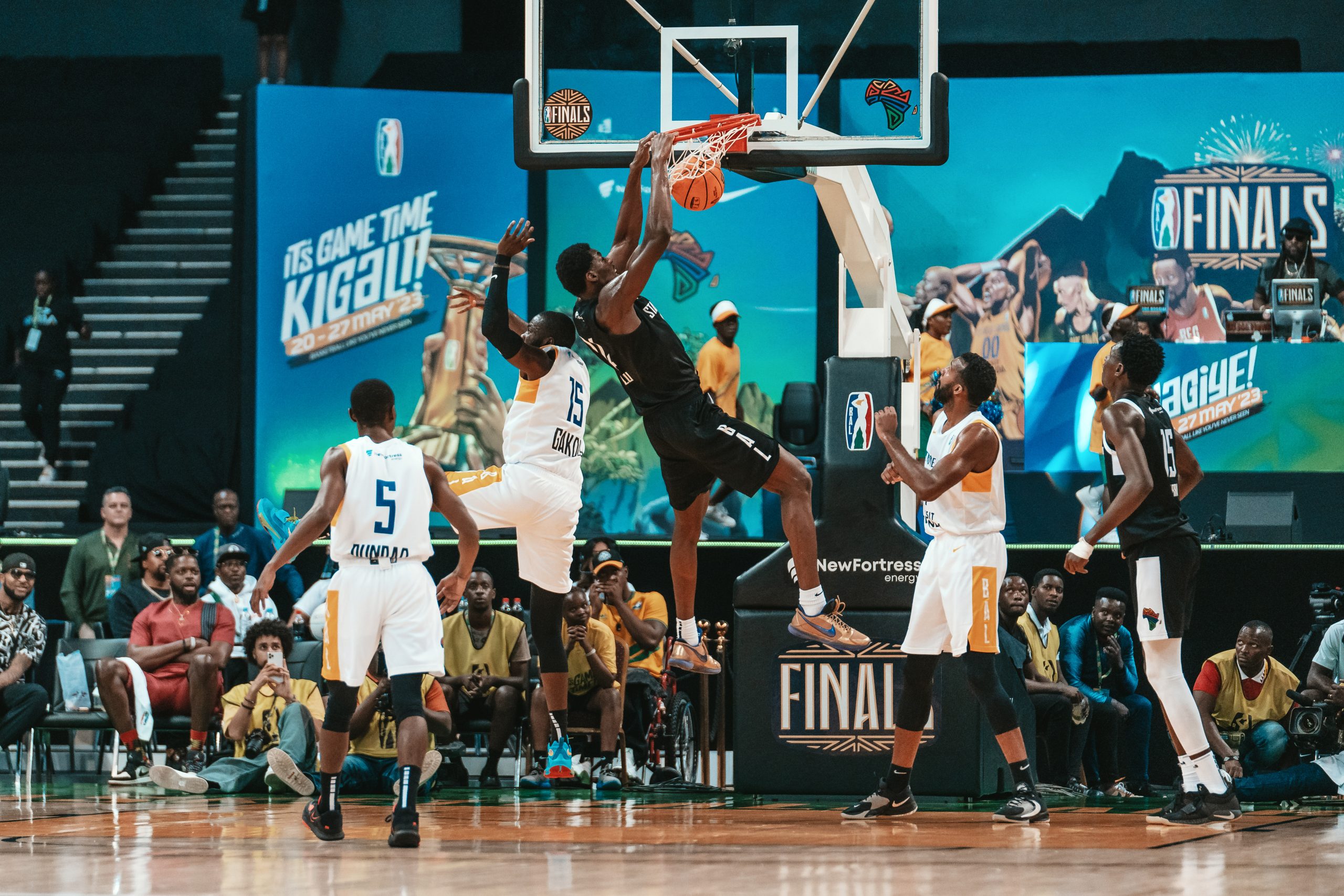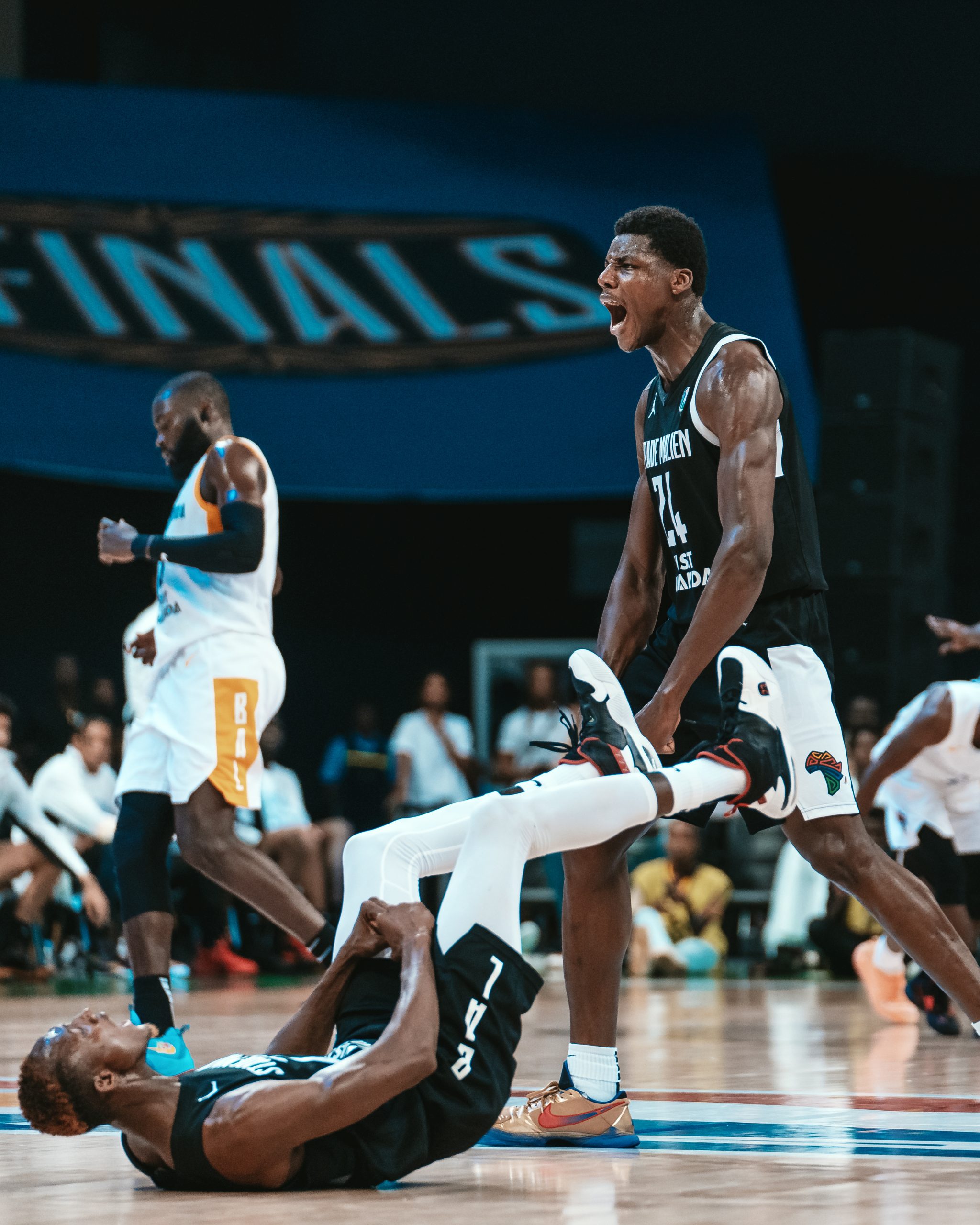Ibidun Allison emerged from her car at a bustling market in Lagos, Nigeria, and was immediately swarmed by eager vendors. “Mommy, mommy, come buy from me!” they shouted. “Buy from me!”
An actress then in her seventies, Allison peered out at the group and saw one figure towering above the rest.
His name was Rueben Chinyelu.
He was 14 years old and stood around 6-8.
Allison couldn’t believe her eyes. What was this boy doing here? Why was he selling clothes? She maneuvered through the crowd to find him.
“Do you play basketball?” she asked Chinyelu.
He smiled and laughed, as he did every other time someone asked him that question.
“I’m serious,” Allison said. “You could go to school playing basketball. You could further your education.”
This caught Chinyelu’s attention. The idea of playing basketball had never been framed to him in this way—as a possible ticket to a better education. And for some reason, it struck a different chord coming from Allison. Chinyelu had never played basketball before in his life. But suddenly, he felt compelled to pursue it. “I just think everything happens on God’s timing,” he says.
That was the summer of 2018. Six years later, Chinyelu is a 6-11 rising sophomore at the University of Florida. He transferred from Washington State University, where he played in all 35 games last season and finished fourth in the Pac-12 in blocks.
Growing up in the eastern region of Nigeria, Chinyelu was six years old when he lost his father. His mother raised him and his three older sisters, emphasizing discipline and education above all else. Chinyelu didn’t play any sports as a kid—not even soccer, which is by far the most popular sport in Nigeria. Instead, he focused entirely on his schoolwork and dreamed of one day becoming a doctor.
Everything changed that afternoon in 2018 when Allison, whom Chinyelu now refers to as his grandma, walked into his brother-in-law’s shop. Less than a week later, Chinyelu went to the National Stadium to register to join Raptors Basketball Academy. Despite his inexperience and rail-thin frame, he made an immediate impression on his new coach, Charles Ibeziakor.
“I saw something that was different from the other boys that come to learn basketball,” Ibeziakor says. “I saw that this guy is going to be a potential player, a prospect, because of his hard work. He did not relent.”
Chinyelu’s discipline carried over from academics to basketball. If I’m doing this, I’m all in, he told himself. The team practiced Monday through Friday from 8 a.m. to noon during the summer, but Chinyelu would come to the court at 6 a.m. for extra work. He trained individually with Ibeziakor every Sunday and watched tutorials on YouTube to tackle the fundamentals. Soon, his dream was to make it to the NBA.
Within a year, Chinyelu was picked to represent Nigeria in the 2019 FIBA U16 African Championship. He averaged 12.3 points and 17.6 rebounds (best in the tournament) to help his team place third. “He was one of the best,” says Ibeziakor. “From there, I knew that this guy was going to go places.”
Even before his debut for the junior national team, Chinyelu received interest from high schools throughout the United States, but his request for a visa was denied by the embassy. Eight times. And Chinyelu never really found out why. He was hurt, but undeterred. He just had to find a new path. “If I cry or get mad about it, I’m just doubling the problem,” he says. “I just never doubted myself.”
Coach Ibeziakor is also a scout for NBA Academy Africa, an elite basketball training center in Saly, Senegal. The Academy was established in 2017 to provide top high school-age prospects from across the continent with the tools necessary to pursue a future in the sport. Chinyelu arrived in 2021, having gotten much stronger after working out at home during the pandemic. He now had access to state-of-the-art facilities and was surrounded by the best young players in Africa, all of whom shared his ambition to reach the next level. In the school’s multi-purpose room, where the students eat, watch TV and socialize, pictures of African players who have made it to the NBA adorn the walls—a constant reminder of the goal they are all chasing.
With expert guidance from staff members such as technical director Roland Houston and head coach Alfred Aboya, Chinyelu improved dramatically at the Academy. “They have plays. Back home, we don’t have plays,” Chinyelu describes. “Just go play basketball, catch the rebound, pass the ball, make baskets. It was different getting breakdowns, extra workouts, when to work out, how to maintain your sleep. In the Academy, they didn’t just teach us about basketball—they taught us how to be a basketball player and also how to be a man. Because it all works together.”
Chinyelu founded the “6:00 a.m. Club” with Coach Aboya, a morning workout ritual that his teammates, who typically reported to the gym closer to 7:00 a.m., eventually joined. “He’s a tireless worker,” says Aboya. “He will bug you to work him out.”

The Academy competes in exhibitions and showcases across the globe, and Chinyelu also participated in the 2022-23 Basketball Africa League (BAL) season, averaging 5.4 points and 7.9 rebounds for Stade Malien. Since he started so late, his game—particularly on offense—is still being polished, but Chinyelu always brings energy and intensity. He becomes “a different person” on the court, according to former Academy teammate Seifeldin Hendawy. “Rueben’s game is so emotional,” Hendawy, an incoming freshman at Loyola Chicago, continues. “Super aggressive. When he comes between the lines, he just forgets everything. He doesn’t care. He’ll be dunking on people, destroying rims.”
Hendawy remembers one game of full-court two-on-two when Chinyelu “just went crazy” battling against fellow Nigerian and current Louisville big man Emmanuel Okorafor. The trash talk was flowing and the match-up was becoming increasingly physical. At one point, Chinyelu threw down a vicious dunk and let out a scream so powerful that it startled Hendawy and other spectators. “The gym was shaking,” Hendawy recalls with a chuckle. Houston eventually had to interject to settle things down a bit. “I’m him, Coach!” Chinyelu hollered at Houston, pounding his chest. “I’m him!”
That image stands in stark contrast to Chinyelu off the floor. He is soft-spoken, polite and eloquent, his comments peppered with the same sort of inspirational phrases that are taped up in classrooms at the Academy.
“Rome wasn’t built in a day.”
“The easy road is not always the way.”
“The only thing I can control is the present.”
“I know that something that is meant to happen is definitely going to happen.”

He has a calming presence that one could easily foresee translating into an excellent bedside manner. While his main objective remains to make it to the NBA, Chinyelu is also studying to become a dentist and plans to take summer classes to finish school should he leave early for the draft.
Chinyelu joins a talented Florida squad (slotted at No. 20 in ESPN’s current rankings) and should assume a much bigger role this season after averaging just 13.8 minutes per game for Washington State. The Gators have several solid frontcourt options, but Chinyelu is projected to start at center. He arrived on campus at the beginning of June following a brief trip back to Africa, during which he visited family in Nigeria and caught the BAL Finals in Rwanda.
Watching him today, his first coach, Ibeziakor, is not surprised by the player Chinyelu has become. “Because I know the kind of person that Rueben is,” he says. “I know that Rueben will work extra to get there—to play in the NBA. And I believe that he will play [there] one day.”
Photos via Getty Images.















